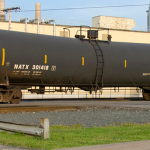
Citizens, local community leaders and environmental groups, representing thousands of area residents, mobilized to call on the New York State Department of Environmental Conservation (DEC) to immediately order a full public safety and environmental review of the proposed expansion of an oil terminal in the Port of Albany today at the agency’s first information forum to allow the public to ask questions and express concerns about the plan.

This expansion would impact communities statewide as a result of the increased transport, for the first time, of crude oil so heavy and thick it must be heated before transfer from rail car to barge or ship before transport down the Hudson and through New York harbor.
On Jan. 28, 2014, Gov. Cuomo (D-NY) issued an Executive Order highlighting the unacceptable risks to hundreds of New York communities and to waterways posed by the expanding transport of tar sands oil by rail and vessel.
“It is the very risks to New York’s communities and waterways of serious accidents and spills called out by our Governor just last week that require DEC to fully evaluate the potentially significant environmental impacts of Global’s crude oil operations in the state of New York,” said Kate Hudson, Watershed Program director at Riverkeeper.“Allowing the new Port of Albany facility to move forward without studying the environmental consequences of a heavy crude spill and the ability to respond to such a spill, opens our river and communities up to the possibility of irreparable damage.”
“We call on DEC to do the right thing, to do what is required by New York State environmental law and regulations, and immediately direct Global to prepare a full environmental impact statement that evaluates the potential impacts connected with all of its current and proposed operations in the Port of Albany and in New Windsor, New York and provide all potentially impacted communities with the opportunity to fully participate in that environmental review,” Hudson continued. “Anything less does not honor the governor’s call to take action to protect communities from the risks of crude oil transport.”
Communities from Buffalo to New York City are unprepared against a hazardous accident. Furthering community concern, Global Partners has not been required to fully evaluate the potential environmental impacts of its application to add boilers to its Albany Terminal operations.

“No matter how you look at it this is a bad idea, which is why Big Oil tried to sneak it through without community involvement,” said Conor Bambrick, of Environmental Advocates of New York. “New York is completely unprepared to regulate the rail and shipping of this new kind of heavy, toxic and explosive crude. State, federal and local authorities cannot turn a blind eye and hope for the best—they must ensure full industry accountability and public involvement for every impacted community before opening the doors to a disaster.”
Recent train derailments and fires across the U.S. and Canada have also raised new concerns about the explosiveness of certain crude oils and the safety of some types of rail cars now in use. And the question as to who will pay if the Hudson River—a unique and irreplaceable resource—is devastated by a heavy crude oil spill remains unanswered. In the aftermath of the crude oil disaster in Lac-Mégantic, all of the companies identified as having responsibility have filed for bankruptcy and the public has been left to pay the bill.
“A spate of horrific spills and accidents involving the transport of crude oil across North America have demonstrated not only the serious threats it presents to human life, health and the environment, but also the gross inadequacy of current federal and state safeguards against those threats,” said Kate Sinding, Senior Attorney with the Natural Resources Defense Council. “We commend Gov. Cuomo for taking these important first steps towards addressing the potentially catastrophic risks presented by crude oil storage and shipment in New York State, and we urge him to undertake additional measures to ensure that this activity not be permitted to continue unless the full measure of risks is understood and essential safeguards are in place.”
“Why are we using a nineteenth century form of transportation carrying a twentieth century fuel in the twenty-first century of renewable energy?” Sandy Steubing of People of Albany United for Safe Energy asked pointedly.
Community and environmental leaders calling for action included, Albany City Councilmember Dorcey Applyrs, Albany City Councilmember Vivian Kornegay, Earthjustice, Environmental Advocates of New York, Natural Resources Defense Council, People of Albany United for Safe Energy and Riverkeeper.
Visit EcoWatch’s WATER and TAR SANDS pages for more related news on this topic.


Leave a Reply
You must be logged in to post a comment.